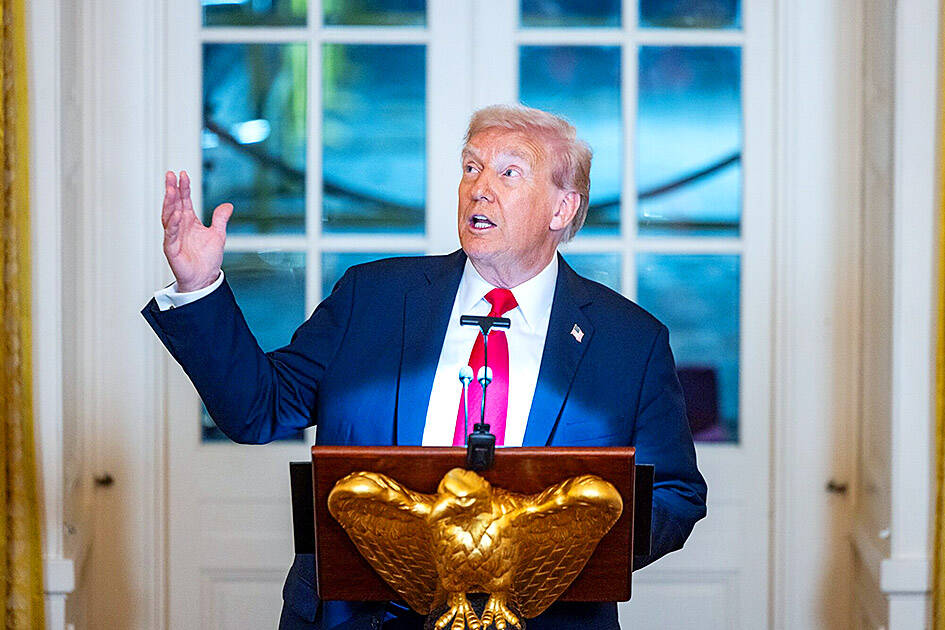US President Donald Trump on Wednesday said that he had authorized covert CIA action against Venezuela and was considering strikes against alleged drug cartels on land in the South American country.
Trump’s comments prompted Venezuelan President Nicolas Maduro to decry “coups d’etat orchestrated by the CIA” and ordered military exercises following a fresh US strike on an alleged drug boat in the Caribbean.
Under Maduro’s direction, exercises have been conducted across the Atlantic Caribbean coast of Venezuela.

Photo: EPA
Trump declined to comment in detail about a New York Times report that he had secretly approved the CIA to conduct covert action in Venezuela against Maduro.
“But I authorized for two reasons really,” he said, accusing Maduro of leading a “narco-terrorist” regime, and of releasing prisoners from jails and sending them to the US.
Asked if he had given the CIA authority to “take out” Maduro, Trump replied: “That’s a ridiculous question for me to be given. Not really a ridiculous question, but wouldn’t it be a ridiculous question for me to answer?”
Trump added that he was weighing up whether to expand US military actions against alleged Venezuelan drug cartels to the land after a series of deadly naval strikes on boats.
“We are certainly looking at land now, because we’ve got the sea very well under control,” Trump told reporters at the White House in Washington.
At least 27 people have been killed in US attacks on boats in the Caribbean.
Trinidad and Tobago, which is off Venezuela, is investigating whether two of those killed were its citizens, officials said on Wednesday.
Colombian President Gustavo Petro has called on the UN to open a “criminal process” against Trump for the strikes, which he believes have also killed Colombians.
Trump’s comments came amid a major US naval buildup in the Caribbean that Washington says is part of an anti-drug operation.

The latest batch from convicted sex offender Jeffrey Epstein’s e-mails illustrates the extraordinary scope of his contacts with powerful people, ranging from a top Trump adviser to Britain’s ex-prince Andrew. The US House of Representatives is expected to vote this week on trying to force release of evidence gathered on Epstein by law enforcement over the years — including the identities of the men suspected of participating in his alleged sex trafficking ring. However, a slew of e-mails released this week have already opened new windows to the extent of Epstein’s network. These include multiple references to US President Donald

CHARGES: The former president, who maintains his innocence, was sentenced to 27 years and three months in prison for a failed coup bid, as well as an assassination plot Far-right former Brazilian president Jair Bolsonaro is running out of options to avoid prison, after judges on Friday rejected his appeal against a 27-year sentence for a botched coup bid. Bolsonaro lost the 2022 elections and was convicted in September for his efforts to prevent Brazlian President Luiz Inacio Lula da Silva from taking power after the polls. Prosecutors said the scheme — which included plans to assassinate Lula and a top Brazilian Supreme Court judge — failed only due to a lack of support from military top brass. A panel of Supreme Court judges weighing Bolsonaro’s appeal all voted to uphold

Chinese tech giant Alibaba yesterday denied it helps Beijing target the US, saying that a recent news report was “completely false.” The Financial Times yesterday reported that Alibaba “provides tech support for Chinese military ‘operations’ against [US] targets,” a White House memo provided to the newspaper showed. Alibaba hands customer data, including “IP addresses, WiFi information and payment records,” to Chinese authorities and the Chinese People’s Liberation Army, the report cited the memo as saying. The Financial Times said it could not independently verify the claims, adding that the White House believes the actions threaten US security. An Alibaba Group spokesperson said “the assertions

LEFT AND RIGHT: Battling anti-incumbent, anticommunist sentiment, Jeanette Jara had a precarious lead over far-right Jose Antonio Kast as they look to the Dec. 14 run Leftist candidate Jeannette Jara and far-right leader Jose Antonio Kast are to go head-to-head in Chile’s presidential runoff after topping Sunday’s first round of voting in an election dominated by fears of violent crime. With 99 percent of the results counted, Jara, a 51-year-old communist running on behalf of an eight-party coalition, won 26.85 percent, compared with 23.93 percent for Kast, the Servel electoral service said. The election was dominated by deep concern over a surge in murders, kidnappings and extortion widely blamed on foreign crime gangs. Kast, 59, has vowed to build walls, fences and trenches along Chile’s border with Bolivia to